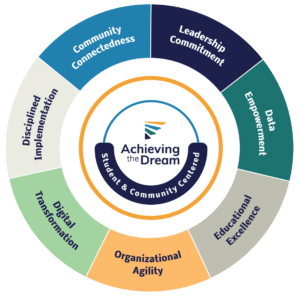Achieving the Dream’s Institutional Capacity Framework is a comprehensive approach to addressing the emerging needs of the field to improve results for all students, especially those who are marginalized. The framework is built on seven essential capacities for colleges to create the student-focused culture that promotes student success. Evidence shows colleges must be strong in each capacity area to take on any large-scale interventions.
With student and community centeredness at the nexus of — and connected to — all seven capacities, the ATD framework weaves together research, experience from other Network colleges, and the best thinking about student success from the field with the successful strategies already underway on campus, such as redesigning academic and career pathways, engaging faculty in student success, putting data and information in the hands of faculty and advisors for evidence-based decisions, preparing for accreditation, integrating planning and advising systems, and addressing students’ financial challenges to help them continue their studies.

Based on the Institutional Capacity Framework, our Institutional Capacity Assessment Tool (ICAT), is a self-assessment that helps colleges understand where they’ve been, so they can build a path forward grounded in the fundamentals that make transformation possible.
Connect with us to learn moreCommitting to develop a shared vision, align resources, expand leadership, motivate people, and hold constituents accountable for educational, workforce, and community outcomes
Establishing a culture of evidence and inquiry through data access, data literacy, and data-informed planning, decision-making, and continuous quality improvement.
Fostering teaching innovation and excellence inside and outside the classroom and offering personalized student support through learner-centered design and practice.
Developing an ecosystem of learning and curiosity, creating organizational flexibility, and ensuring horizontal decision-making and fluid communications to support innovation and proactive response to community needs and rapid change.
Leveraging digital technologies to enhance learning and support for all students and to strategically advance operational integration, productivity, and efficiency.
Aligning and empowering people to plan, navigate, execute, monitor, and improve change effectively and within a shared learning environment.
Nurturing strategic partnerships, developing shared goals, leveraging community resources, and engaging in collective effort to support access, student success, workforce outcomes, and thriving communities.
Contact Us
Learn more about how our Institutional Capacity Assessment Tool (ICAT) can give you actionable insights on your journey to whole-college transformation.
View ICAT information as a PDF
Frequently Asked Questions
The Institutional Capacity Assessment Tool (ICAT) is an online self-assessment that helps colleges determine their current level of capacity in each of the seven key dimensions. The assessment is most useful when it is administered to a broad group of stakeholders, including representatives from the board of trustees, president’s cabinet, administrators, full-time and adjunct faculty, staff and student success teams. A discussion of the results with a cross-section of the college community as well as ATD Leadership and Data Coaches identifies strengths and areas in need of bolstering and generates actionable ideas.
The ICAT also provides colleges with additional benefits related to their accreditation cycle. The seven regional accrediting agencies have some variation in accreditation standards or criteria, but they have all adopted a cycle or process (often referred to as “closing the loop”) for colleges to use through the self-study or compliance certification process. The ICAT can provide an additional assessment tool that produces a numeric result with qualitative feedback from faculty and staff who participate in accreditation processes. Read the full publication on aligning the ICAT to accreditation.